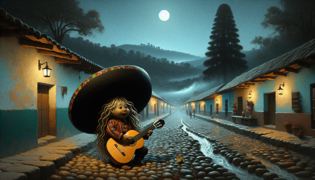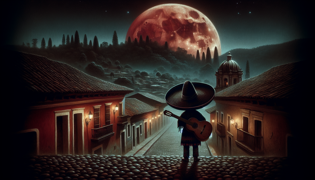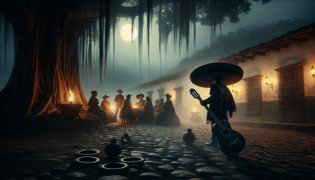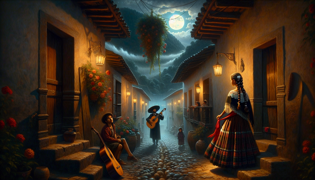El Sombrerón: The Haunting Serenade of Guatemala
Reading Time: 10 min

About Story: El Somberrerón is a from guatemala set in the . This tale explores themes of and is suitable for . It offers insights. A legend of El Sombrerón, a small man in a large hat, serenading women with haunting songs, braiding hair, and causing distress in Guatemalan folklore.
Introduction
The wind whispered through pine needles as midnight veiled the cobblestones in a silken hush. In the mountain village of San Jerónimo, folk still tremble at the mere mention of a small man crowned by an enormous sombrero. He drifts between lantern-lit doorways, caressing guitar strings with fingers as delicate as spider’s silk. Some say his tune is sweeter than sugarcane syrup; others whisper it lodges in the soul like a thorn. A faint aroma of roasted coffee beans clings to his coat, mingling with the cool scent of dew on earthen walls.
In those nights when the church bells had long ceased their echoes, girls would awaken to find their braids intricately entwined—each plait a testament to his midnight artistry. Rumours swirled in hushed tones: “¡Qué chilero!”, they’d marvel, gazing at tresses coiled like vines. Yet joy soon turned to torment as sleepy eyes lost their sparkle and hearts pounded like trapped birds. The plaited knots chafed against their nape, rough as sisal, and the distant rustle of wind through the coffee trees felt like mocking applause.
Púchica, the villagers would sigh, for no remedy proved effective. Mothers sprinkled holy water. Priests chanted prayers into the thick darkness. But when El Sombrerón’s guitar resumed its lament at the stroke of midnight, dread crept back with the softness of velvet shadows. This was not a mere trickster; legend insisted he sought more than pretty locks. He pursued devotion, enslaving affection until desperation overcame fear. And so it remained: by candlelight, mothers and daughters trembled at every distant melody.
Origins in Whispered Legends
Long before the steam engine hissed its arrival, the highlands of Guatemala brimmed with spirits both benign and sinister. Elders around fires spoke of a tattered hat drifting upon the breeze, as though seeking a head small enough to cradle its brim. They called him El Sombrerón, the Little Hat Man, although his stature scarcely reached a girl’s waist. He wore his sombrero like a crown of ebony; beneath it lay obsidian eyes gleaming with moonlight’s reflection.
Origins vary with each tale. Some claim he was once a rejected suitor, scorned by a beauty of such renowned grace that villagers compared her to a sunlit orchid. In jealous rage, he traded his soul for the power to ensnare hearts by night. Others insist he is a spirit of the cacao groves, forever pining for human warmth. Regardless, his method remained constant: a soft guitar tune drifting through open windows.
On a night scented with roasting maize and damp earth, he arrived in San Sebastián. The air was thick with murmurs of an approaching storm, the distant tick of raindrops against tin roofs like the timid drumbeat of curiosity. That first serenade left three young women sleepless, their hair entwined in unnerving perfection—braids looped twice around their heads, as if binding their very souls. Their breath came in shallow gasps; pulses throbbed like horses at full gallop.
An elderly woman named Doña Martina confessed she recognised the chords. “Those notes,” she murmured, her voice fragile as aged parchment, “echo the lament of lost devotion.” She recalled how, decades earlier, her granddaughter Rosemaría had fallen under his spell. Though Rosemaría’s heart healed with time, the memory remained like a bruise upon the village’s history.
By dawn, lanterns flickered to life. Cottonwood smoke coiled in the chill air, and villagers stepped into the streets, clutching talismans of garlic and rue. Yet El Sombrerón’s legend refused to perish. Rather, it grew like kudzu across the hills—inescapable, creeping, and ever hungry.

Midnight Serenades and Braided Curses
The villagers soon learned that to hear his serenade was to invite his company. Doors were bolted, windows shuttered, yet sometimes the slightest crack would suffice for his melody to slip inside. His voice, as smooth as polished obsidian, floated through rooms like a spectral lullaby. Those who listened felt their hearts flutter like caged hummingbirds, each note sewing longing into their marrow.
One clear night, when the scent of jasmine drifted from courtyard flowers, fifteen-year-old Isabela dared to glance through a chink in her shutters. She found him perched upon the windowsill, legs dangling like marionette strings, guitar resting on bent knee. His hat brim brushed her forehead; she shivered at the cool caress. Without a word, he began to braid her hair, fingers deft as weaving spiders. The strands folded beneath his touch like ribbons of night.
Isabela tried to scream, but no sound emerged beyond a strangled sob. Outside, faint church bells tolled two o’clock. Rue stalks in tiny pots quivered in the darkness, exhaling a bitter sweetness. Within minutes, her braid was complete: a complex coil crowned with a single obsidian rose. Bewildered, she watched as he vanished into the night, leaving a faint echo of guitar chords as farewell.
In the days that followed, Isabela became pale—her cheeks hollow as worn coins. Villagers spoke of her constant humming, unable to tear herself away from the tune still lodged in her mind. She refused to leave her chamber, fearing another midnight visit. The braid was unshakable, as though grown to her scalp, and nightmares of entanglement haunted every slumber.
Despite fear, some felt pity. They tossed silver coins beneath doorways, hoping to appease his appetite for devotion. Others sacrificed clothing or ribbons. Yet each offering seemed only to whet his appetite. The villagers concluded that El Sombrerón sought not silver nor silk, but true adoration—unquestioning loyalty that bound a maiden’s soul to his own. And so the curse of braided hair became his calling card, part blessing, part doom.

Fear, Defiance, and Village Remedies
As autumn deepened, fear grew like ivy along shutters. Mothers kept daughters close; suitors armed themselves with carrots, garlic and baby hair brushes. Legends said the carrot’s pungent scent repelled the intruder, while the brush’s bristles scratched his skin. Yet El Sombrerón seemed indifferent. He slipped past barricades as deftly as smoke through a keyhole.
One evening, a group of brave villagers gathered in Doña Martina’s courtyard. The smell of corn tortillas on the comal mingled with the smoky oil of torches. Banter erupted: “If this charlatan wants an admirer, we’ll give him a congregation!” exclaimed Uncle Facundo, brandishing a braid guard fashioned from iron. “Púchica, I’ll teach him a lesson!” The women exchanged knowing glances, tracing their knuckles over beads with hymnal prayers.
They hatched a plan: to lure him with an untouched violin and a fresh braid, then trap him beneath the banyan tree. Dusk arrived thick with humidity and cicadas droning like heated iron. As church bells chimed, a lonely violin joined their hymn. El Sombrerón emerged—drawn by melody, eyes wide as burnt umber spheres. He approached gracefully, suspicion tempered by curiosity.
At the edge of a flickering firelight, the villagers sprang their trap. Iron rings clamped around his ankles. He looked small and vulnerable, hat askew, guitar fallen aside. For a heartbeat, compassion flickered in the crowd. The air tasted of rust. Then he smiled—an expression still capable of melting stone. He whispered a final chord, and the iron bindings cracked like brittle eggshells.
A gale swept through the courtyard, snuffing torches and scattering terracotta pots. They heard his retreating laughter mingled with the rustle of banyan leaves. Though the trap failed, the villagers discovered something vital: they shared their fear, their courage, and their stories. In unity, they retained the power to face him. The curse remained, but so did their solidarity.

Clash of Will and Lingering Echoes
The following night, San Jerónimo lay in an uneasy hush. Dew formed on banana leaves, shimmering like fragments of shattered glass. Lantern flames quivered in windows, and distant cattle lowed with forlorn cadence. Villagers barricaded themselves indoors, clutching crucifixes carved from guaiacum wood.
Meanwhile, in a silken chamber upstairs, Isabela gathered her resolve. She had lain awake for weeks, refusing nourishment lest she encounter the braid’s binding touch again. Then an idea flickered: if devotion bound her to him, might rebellion free her? She threaded a red ribbon, soaked in salted water and sprinkled with holy ash, into her braid. Her palms trembled, the ribbon’s texture rough as unfiltered tobacco.
At midnight, the guitar began its mournful call. Isabela swung open her door, candle in hand. The stairwell filled with his ringing chords, each note echoing like a bell toll. He appeared on the landing, silhouette stark against the lantern glow, hat rim brushing the ceiling. His eyes searched her face, unblinking and expectant.
She stood firm, ribbon held like a gauntlet. When he raised his head to braid her hair, she thrust the ribbon forward. It tangled first in his hatband, then around his fingers. He recoiled, face paling beneath moonlit streaks. Isabela whispered, “¡Ni modo! You’ll braid no more.” The ribbon seethed with salt’s sting; he released a cry like wind through cracked shutters.
The next instant, he vanished—guitar and sombrero tumbling to the floor. In the morning, the streets smelled of cinnamon from the baker’s ovens, and villagers emerged blinking at sunrise. They found a black rose, petals scorched at the edges, resting atop Isabela’s red ribbon. No trace of El Sombrerón remained. To this day, lovers still braid ribbons into their hair, a pledge against the night’s whisper… and a testament to courage born of defiance.

Conclusion
Though El Sombrerón vanished that dawn, his legend endures as sure as the volcanoes stand in vigil over Guatemala. In every courtyard, young women braid ribbons into their hair as a shield, both homage and defence against unseen suitors. Even brides at weddings leave a single strand unbraided, lest they invite a melody through the window. The scent of jasmine and roast coffee continues to mingle at twilight, a reminder of nights when devotion and dread danced together beneath the low-slung brim of a hat.
Scholars and storytellers debate whether he was a spurned mortal or a spirit born of the land. Yet villagers speak little of classification; they simply know that love can bloom like orchids in an orchidaria, but unchecked longing may twist like a vine around the heart. The roses on the door-knockers come from the cacao groves—some say plucked by unseen hands—testifying to an affection that is as insistent as it is unsettling.
Now, when a cool breeze stirs the pines and a lone guitar chord drifts on the wind, doors are bolted and lanterns lit. Children hush to listen, and elders nod at one another in knowing silence. They share their tales in hushed tones, embellishing details like artisans weaving brocades of myth. Yet every story carries a kernel of truth: the power of a melody, the weight of a braid, and a small man’s grand sombrero that can eclipse reason.
And so, beneath starlit skies and the watchful peaks of Tajumulco and Acatenango, the legend marches on. It reminds us that the line between enchantment and peril is as fine as a hair strand. In love as in folklore, one must tread carefully, lest a midnight serenade leave them forever ensnared.

















